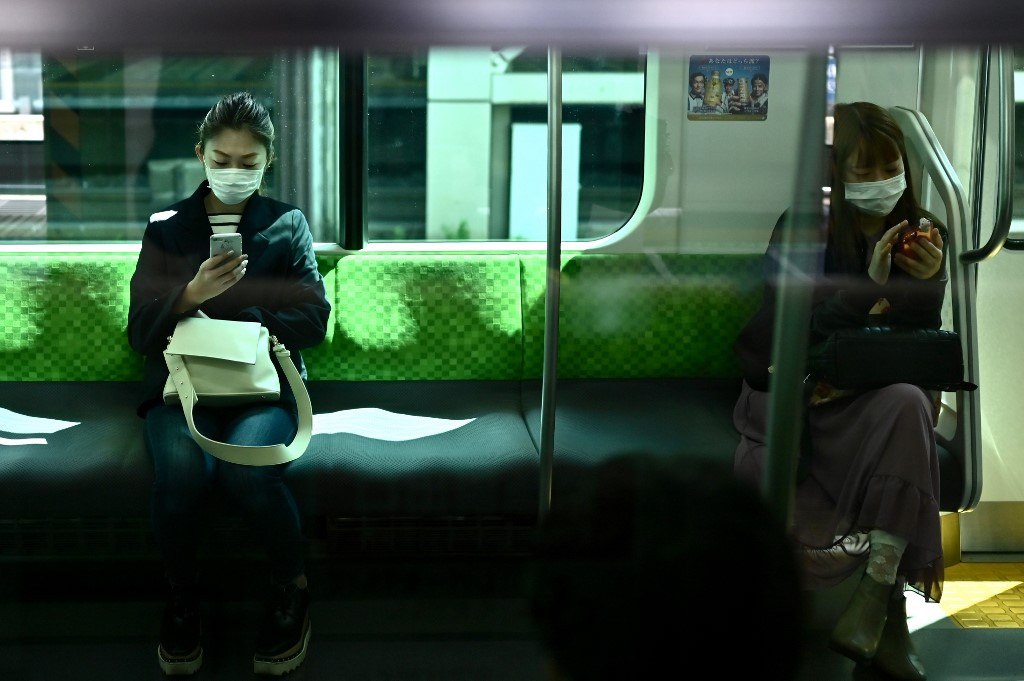Tokyo sees biggest daily jump in infections as coronavirus emergency begins: NHK
Capital's 144 infections are biggest daily jump in pandemic.
Change Size
 Women use their phones on the Yamanote Line train in Tokyo on Wednesday, on the first day of the state of emergency. - Japan on April 7 declared a month-long state of emergency over a spike in coronavirus cases, ramping up efforts to contain infections but stopping short of the strict lockdowns seen in other parts of the world. (AFP/CHARLY TRIBALLEAU )
Women use their phones on the Yamanote Line train in Tokyo on Wednesday, on the first day of the state of emergency. - Japan on April 7 declared a month-long state of emergency over a spike in coronavirus cases, ramping up efforts to contain infections but stopping short of the strict lockdowns seen in other parts of the world. (AFP/CHARLY TRIBALLEAU )
T
okyo recorded 144 coronavirus infections on Wednesday, its biggest daily jump since the start of the pandemic, public broadcaster NHK said, without citing sources on the first day of a state of emergency aimed at containing the outbreak.
Total infections in the Japanese capital stand at 1,339, NHK said, for an increase that would carry the nationwide tally beyond 4,600, including 98 deaths, based on numbers it published earlier in the day.
The number of infections is still far smaller than in many European countries and the United States, but a steady rise in some areas prompted Prime Minister Shinzo Abe to declare the emergency in Tokyo, Osaka and five other hard-hit prefectures.
A day after it was announced, commuters heading to work packed into trains in Tokyo, with some expressing confusion over how best to restrict their movements.
"It's unavoidable that people have to come out for work," said Risa Tanaka, an office worker wearing a mask near the Shinjuku station, who said she usually tried to work at home, but had stepped out to deliver some documents.
"I don't know if the emergency declaration is enough."
The scenes in Tokyo contrasted with measures across Europe enforced by police patrolling the streets and also through the use of drones in some countries, such as Britain and France.
French residents have had to sign and carry an official form justifying their presence outside homes and face stiff penalties for breaches.
Despite some accusations of heavy-handed policing, the enforcement has largely succeeded, leading to bare city streets and the effective shutdown of much of Europe’s local economies, though some flouting has included barbecue gatherings in parks.
Japan's month-long virus emergency gives regional governors more power to press businesses to close, but will add to pains inflicted on the world's third-largest economy from supply chain disruptions and travel bans.
"We've reduced the number of in-office workers by half, but we are still rotating to go into work," said a commuter, Chihiro Kakegawa, an employee of a financial institution near the Tokyo station, adding that it freed her from going to work everyday.
With Tokyo's governor Yuriko Koike expected to announce only on Friday what categories of businesses will have to shut, many shops and businesses have been left to decide on their own for now.
In most cases, Japanese authorities have no penalties to back calls for people to stay home and businesses to shut.
Department stores, karaoke parlors and some non-essential businesses, such as coffee chain Starbucks, have already said they would close. The foreign ministry said it would monitor the temperatures of all visitors and block those with high fever.
With an eye on the economy, Abe has sought a cut of 70% to 80% in contacts among people in the seven regions, leaving plenty of wiggle room for defiance of the request to stay home.
Train schedules of the East Japan Railway Co, which services the capital and surrounding areas, remain unchanged, with operations running as normal.
"I don’t think the reduction is anywhere near the 70 or 80 percent Abe is aiming for," said Yoshihiko Furusawa, 43, as he watched pedestrians near the Shinjuku ward office where he works.
"I think the important point is to stop people going to bars after work."









